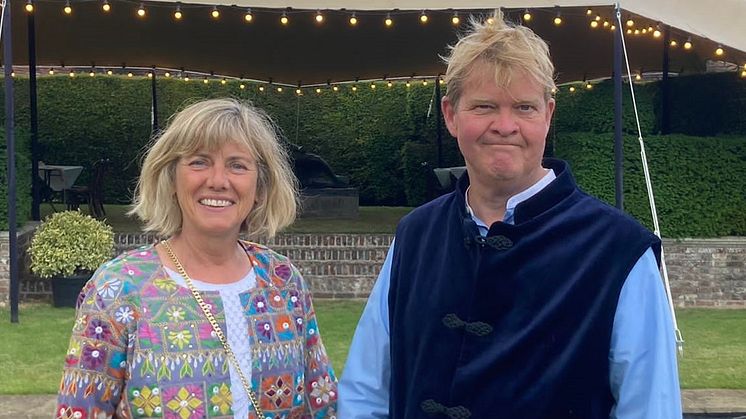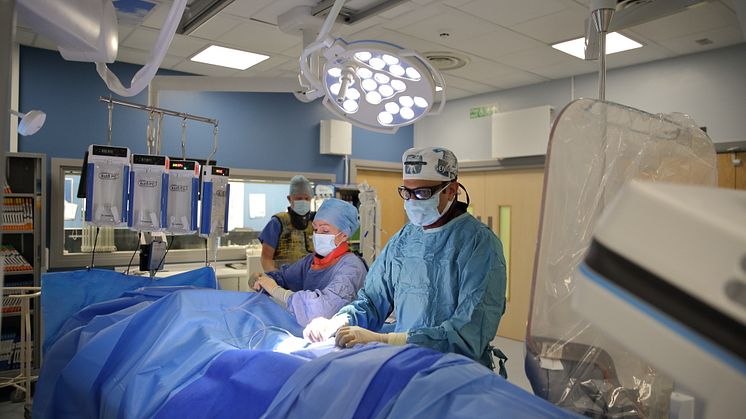
Press release -
Dorset stroke survivor fears thousands could miss out on a ‘miracle treatment’ which saved him
A GP from Dorset who had a game-changing new procedure after having a stroke is backing the Stroke Association’s campaign to make it more widely available.
A report by the charity released today (Thursday 28 July) warns that thousands of people who have a stroke could miss out on having a thrombectomy.
With thrombectomy, clots blocking the supply of blood to the brain can be physically plucked out, rather than that standard treatment using drugs to slowly dissolve them.
But NHS England has missed its original target to make thrombectomy available to all patients for whom it would benefit – only treating a quarter (28%) of all suitable patients by March 2022.
As a GP, Dr John Stephens had known relatively little about thrombectomy but having now had one himself after his own stroke, he’s convinced it should be available to everyone for whom it’s suitable as part of gold standard stroke care.
The thrombectomy played a key part in rebuilding his life after stroke and enjoying his activity hobbies of Alpine walking and racing his sailing boat.
John’s stroke happened at his home in Spetisbury, near Blandford, Dorset, in September last year.
He was getting out of bed ready for work as a GP at The Harvey Practice in Merley, Dorset, where he has cared for the local community for 27 years.
His wife Margo, 59, is a speech and language therapist specialising in stroke and instantly recognised what was happening.
She called 999 and John was taken to the Royal Bournemouth Hospital for initial scans before being blue-lighted to Southampton General Hospital for the thrombectomy.
“They got me straight up to the neuro-centre and rescanned me to check that I was suitable for thrombectomy,” said John, who is also aged 59.
“I was scared and frightened and just let them get on with it. They were comforting me. The consultant held my hand and said ‘Come on John, we are going to go get this done and it will be fine’. It was very compassionate medicine. It was better than any drug they could have given me. I was terrified. I thought I was going to die. This guy was absolutely brilliant.”
“It was done under local anaesthetic and took about an hour. I remember them putting a catheter in my groin. They didn’t quite get the whole embolus (clot) out because I was having a lot pain by the end of the operation but they removed enough to allow me to make a good recovery.”
Margo, who had been waiting anxiously for news, said: “Dr Nick Weir, one of the stroke consultants, called me and said already the brain is full of beautiful blood flowing through the artery that had been blocked. As a speech and language therapist that told me immediately that meant there was good potential that his brain could recover.”
After three days in Southampton, John was transferred to Poole Hospital where he spent three weeks on the Stroke Unit. At this point he was unable to even sit unaided.
His speech was slurred and he also had visual field difficulty. Margo and John felt that he was not receiving sufficient physiotherapy so, after discussion with his Stroke Care Team who agreed that they were not able to provide the amount of rehab John required to achieve his best potential, he moved to a private care home for ten days of intensive physio, something which they had to pay for themselves.
He was then able to return home fully independent, able to go up and down stairs and shower and dress himself. His intensive physiotherapy continued at home four times a week. He continues to see the physiotherapist once a week and the sports therapist once a week.
Six months on from his stroke, and after a lot of hard work rebuilding his strength with physio four times a week, John was reunited with his beloved boat Banyan, a19ft gaff rig which he sails out of Parkstone Yacht Club in Poole Harbour.
“The physio took me to the yacht club to see if I could get back on the boat in March,” said John. “Then I took part in my first race on 21 April, sailing with my friends and crew Michael Richardson and Stephen Dunhill.
“Pre-stroke I would occasionally win and was usually middle of the fleet. This time I wasn’t last. And that was good enough for me!
“It was extremely exciting I couldn’t believe I was there. It was a very emotional moment. My rehab team were absolutely delighted. It was quite an amazing achievement.
“I’ve now started jogging with the physio and with Margo. I am also working with a friend to get back to singing which has been a great love of mine but my sense of pitch and timing was damaged by the stroke.
“I recently returned to Salisbury Cathedral for a choristers’ reunion and joined the choir to sing Evensong. It was another emotional event and something I never thought I would be able to do again. It’s incredible what I have been able to achieve already and we continue to see improvement week on week.
“Like most GPs, I knew of thrombectomy but I’ve never had a patient who had had one and I didn’t really know much about it. Now I know first-hand the importance of rapid access to both thrombolysis and thrombectomy.”
John plans to return to work part time, giving him plenty of opportunities to enjoy his active hobbies.
In May, the couple holidayed in Morzine in France, where they were able to enjoy their hobby of Alpine walking.
Margo said: “John has achieved so much, so quickly. We feel fortunate that he was in the right place at the right time to be able to have a thrombectomy and that coupled with his sheer motivation and drive means that he has been able to make such a good recovery.
“I was so proud to see him helming his boat again in his first race. I’m delighted to have my walking partner back again as is our Cavalier King Charles Spaniel Titus. The physio says he’ll be able to ski again next winter, no problem.”
“John and I feel that we are fortunate to have background knowledge about stroke and rehab and we are able to self-fund his therapy.
“We feel strongly that rapid access to gold standard acute care such as thrombectomy should be available to all patients for whom it would be suitable.
“We believe that his thrombectomy has played a large part in his recovery enabling him to achieve all of his goals. John feels that life is now back to normal and he is able to do all of the things that are important to him.
“We also feel that rehabilitation services should be available to all people who have had a stroke, not just those who have the ability to fund private therapy.
“Thrombectomy provides the opportunity for the brain to recover. In order for people to achieve maximum potential following thrombectomy they must have access to rehabilitation services at an appropriate level,” said Margo.
The Stroke Association is calling for more funding from the Government and a workforce plan from NHS England to provide more staff and equipment to make the procedure available everywhere, 24 hours a day, 7 days a week.
Jacqui Cuthbert, the Stroke Association’s associate director for the South West and the Channel Islands, said hospital staff could be proud of the service they were providing and knew what a difference it could make if it was expanded with more investment.
“Thrombectomy is a miracle treatment that pulls patients back from near-death and alleviates the worst effects of stroke. It’s shocking that so many patients are missing out and being saddled with unnecessary disability.
“A small investment, could save the NHS billions of pounds and that’s before we even start to think of the life-changing benefit to stroke patients.
“Importantly, NHS England must address challenges in transferring patients to and between hospitals in its upcoming Urgent & Emergency Care Plan.”
The Stroke Association are also calling on the public to sign an open letter calling on UK Government to act on the recommendations in its Saving Brains report, and make thrombectomy available as soon as possible, 24 hours a day, 7 days a week, for everyone who needs it. Sign the open letter here.
Topics
Categories
- Stroke strikes every five minutes in the UK and it changes lives in an instant.
- The Stroke Association is a charity working across the UK to support people to rebuild their lives after stroke. We believe that everyone deserves to live the best life they can after stroke. From local support services and groups, to online information and support, anyone affected by stroke can visit stroke.org.uk or call our dedicated Stroke Helpline on 0303 3033 100 to find out about support available locally.
- Our specialist support, research and campaigning are only possible with the courage and determination of the stroke community and the generosity of our supporters. With more donations and support, we can help rebuild even more lives.
- You can follow us on Twitter, Facebook and Instagram.



